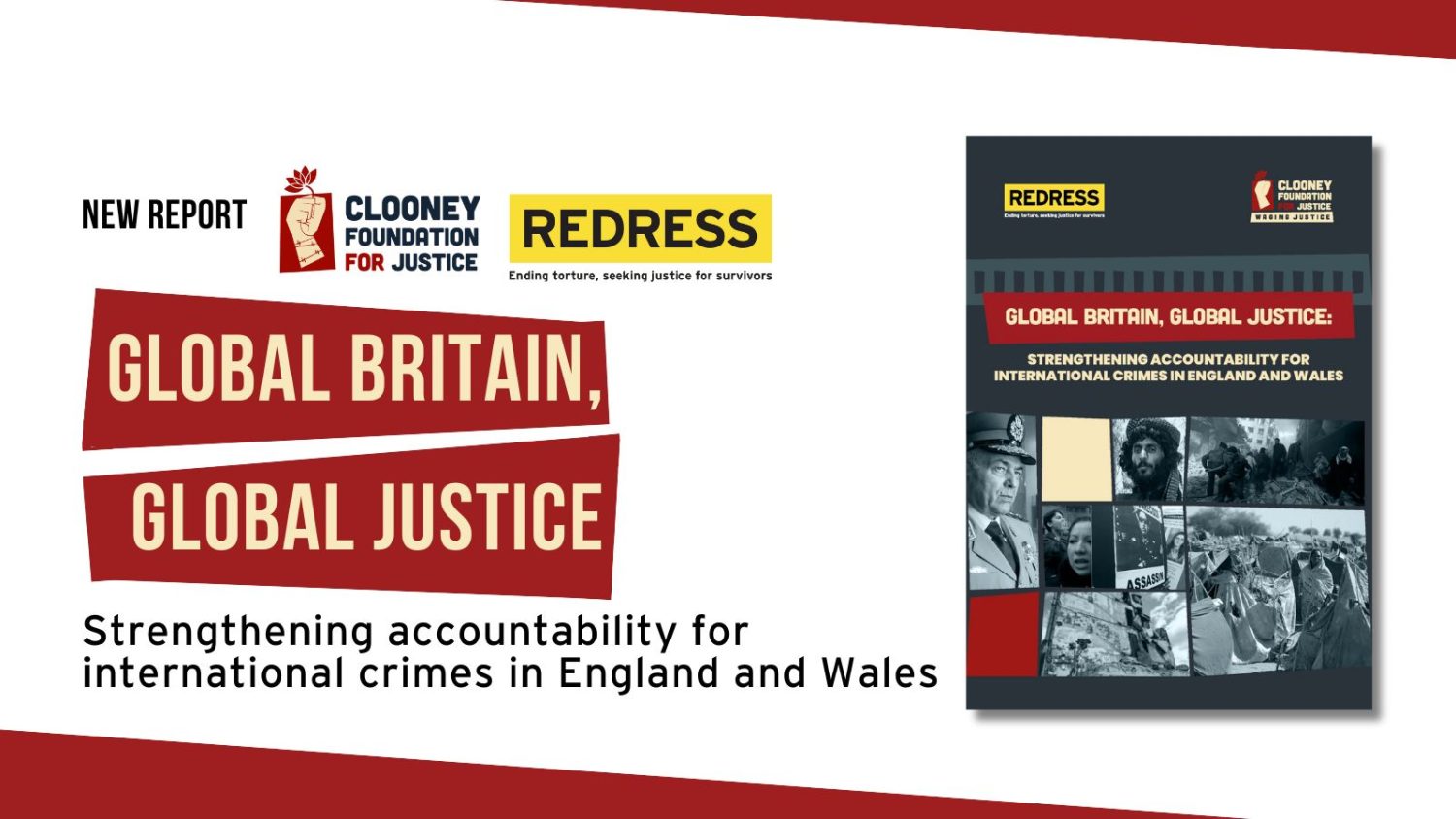
New REDRESS and Clooney Foundation for Justice Report: Answering the Call for Global Justice, Improving Accountability for International Crimes
A new report from REDRESS and the Clooney Foundation for Justice, “Global Britain, Global Justice”, examines how the UK has faltered in its historical commitment to international justice due to a myriad of legal, practical and political challenges that have stymied prosecutions of international crimes in English courts.
The report sets out reforms that would address these challenges and allow for more successful cases to be brought against suspects of the most serious international crimes – such as war crimes, crimes against humanity and genocide – who come to the UK.
The report was launched by the Clooney Foundation for Justice’s Co-President Amal Clooney and REDRESS’ Director Rupert Skilbeck during a panel discussion in the House of Lords, moderated by Baroness Helena Kennedy KC.
Although countries often only have the right to prosecute individuals for criminal offences committed within its borders, the UK is one of more than 150 legal systems around the world that provide for what is known as “universal jurisdiction”. This means that they can try suspects for serious international crimes regardless of where these crimes occur. The rationale behind this principle is that some crimes “so deeply shock the conscience of humanity” that every State has an interest in holding perpetrators accountable.
At present, English law includes only a limited form of universal jurisdiction. English courts can exercise it over the crimes of torture, hostage-taking, and “grave breaches” of the Geneva Conventions, if the perpetrator is present in the UK. English courts also have jurisdiction over genocide, crimes against humanity and war crimes but only if the perpetrator is present in the UK, and is either a UK national or a legal resident. This means that non-citizens and non-residents can come to London without fearing prosecution, even if they are reasonably suspected of committing genocide.
Practical challenges have also stymied convictions. Official data shows that between 2013 and 2015, 135 individuals were refused citizenship in the UK by the Home Office due to their alleged involvement in war crimes, crimes against humanity, genocide or torture. Yet none of these cases were referred to the Metropolitan Police. Under existing guidelines, the police cannot begin investigations until they have a suspect in the UK. As a result of this, and practical challenges in gathering evidence of crimes committed abroad, there have only been three successful prosecutions of international crimes in English courts – ever. The last successful prosecution took place more than a decade ago.
This stands in sharp contrast to other countries such as Germany, France, Belgium and Sweden, whose domestic courts have seen a surge in the number of prosecutions initiated under universal jurisdiction laws in recent years. Courts in these countries have tried and convicted ISIS fighters for genocide in Iraq, Bashar al-Assad’s henchmen for torture in Syria, and Rwandan fighters for their role in the 1994 genocide. These national trials have often been the only chance to obtain some form of justice for survivors of international crimes and their families.
In addition to practical and legal challenges, the report also highlights the difficulties caused by the lack of political will. The UK government currently grants “special mission” immunity to foreign officials visiting the UK, without any exclusion for individuals accused of committing international crimes. This immunity is effectively a “get out of jail free card” for individuals suspected of atrocity crimes. A case mentioned in the report is that of Egyptian General Mahmoud Hegazy, allegedly implicated in torture and other human rights violations in Egypt, including the Rab’a Square massacre, in which over 900 people were killed in 2013. Hegazy avoided arrest when visiting the UK in 2015 after being granted “special mission” immunity by the UK government.
Amal Clooney, co-President of the Clooney Foundation for Justice, said during the launch:
“UK leaders profess a commitment to justice for war crimes around the world, but when it comes to prosecutions, we are falling short. I want to take Ukraine as an example. In the year and half since Russia invaded Ukraine, the UK has repeatedly condemned Putin’s illegal act of aggression. It has frozen more than £18bn in Russian assets, it has sanctioned over a thousand individuals, it has referred the conflict to the International Criminal Court, and it has donated £1m to support the ICC investigation. But if a Russian general who has committed crimes against humanity in Ukraine were to show up at Heathrow, we could not arrest him, and we would not put him on trial. He would instead be left to go to Harrods, to medical appointments on Harley street, or do whatever else he wanted to do. My argument today is that this is wrong.”
Rupert Skilbeck, Director of REDRESS, said:
“The United Kingdom is a country with a commitment to international justice that dates back to the Nuremberg trials, with great expertise in war crimes investigations and prosecutions. But the UK has fallen far behind other countries in Europe when it comes to national trials of those responsible for international crimes. Urgent reforms are needed to ensure the criminal justice system is fit for purpose, and that the UK lives up to those expectations”.
